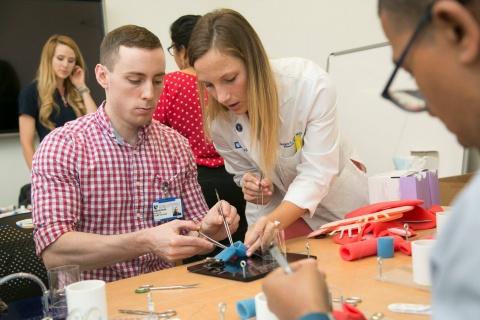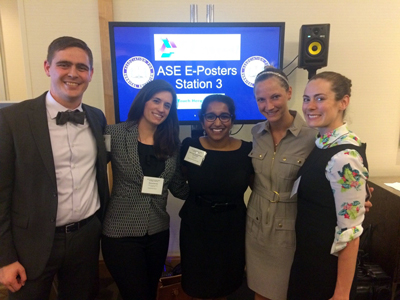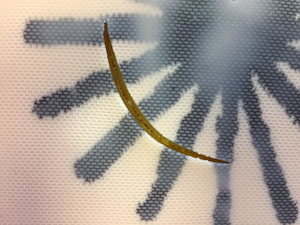
Photo: General Surgery resident Dr. Morgan Cox demonstrates suturing techniques to medical students in the Surgery Technique and Review (STAR) Course
Duke Surgery launches educational research program to improve the learning experience for medical students and residents
As the healthcare landscape continues to evolve, the education of medical students and residents in surgery requires constant evaluation to provide consistently high-quality, cutting-edge patient care.
In November 2015, the Department of Surgery created the Duke Surgical Education Research Group (SERG), a grass-roots, resident- and medical student–led initiative that aims to improve surgical education at Duke University, in the local Durham community, and worldwide.
Cofounded by John Migaly, MD, General Surgery Residency Program Director, and Shanna Sprinkle, MD, PGY5 General Surgery Resident, Duke SERG brings together multidisciplinary teams in a collaborative environment to focus on four key areas of surgical education: knowledge, curricula, technical skills, and behavior.

Dr. Migaly says the impact of the new partnership became evident at the group’s first meeting. “When we all met in one room, we saw more people helping each other with their projects and, more importantly, a lot of the ideas were really ground-up instead of top-down,” says Dr. Migaly, Duke SERG Faculty Leader. “I think this ground-up approach really makes the group successful.”
The program offers a unique research opportunity for Duke medical students and residents interested in education research. Trainees can collaborate with other faculty members from around the university, including behavioral biologists, neuroscientists, and statisticians.
“We had a lot of medical students and residents who were interested in doing these types of research projects so the idea was to coalesce that into one formalized group,” says Dr. Sprinkle, Duke SERG Resident Co-Leader.
Duke SERG integrates a rigorous research approach using scientifically robust methodology to overhaul the way medical students and residents are trained in surgery. Because of the breadth of resources provided by the Duke Department of Surgery, Duke SERG is uniquely suited to respond to the critical scientific questions that emerge from the group.
“By asking more difficult questions at a place like Duke, we have the support in the group to try and tackle those questions that groups at other institutions may not be able to answer,” says Morgan Cox, MD, PGY4 General Surgery Resident and Duke SERG Resident Co-Leader.
Since its inception, the group’s impact has reached far and wide, including several large grants totaling over $250,000, presentations at national meetings, and 6 research articles in peer-reviewed journals.
Creating an Incubator of Innovation
In April 2017, Duke SERG implemented the Surgery Technique and Review (STAR) course, a 2-week surgery preparatory course for medical students looking to pursue a career in surgery. The STAR course prepares students for real challenges as surgical residents via technical skills training in the Duke Human Fresh Tissue Laboratory, where they receive a unique hands-on experience.

skin with heat-activated tattoos
In addition to the STAR course, the group has produced several training devices to help medical students hone their skills, including a new device that measures tension when students tie surgical knots, a brain stimulation project, and simulated skin with tattoos that disappear and appear to help students know if they are suturing correctly.
By focusing on technological advances in surgical education, SERG has developed innovative interventions to improve resident education and wellness. The group is currently conducting a time study to determine how the electronic medical record system interferes with a resident’s or faculty member’s daily activities.
“We have terabytes of data on every keystroke that every resident and faculty member makes during the day so we can figure out how much time residents and faculty are spending on a medical record,” says Dr. Migaly. “How much of that time is after 6:00 pm, and how much of an 80-hour work week is spent in front of a computer instead of in an operating room or in front of a patient?”
With funding from an innovation grant, Duke SERG developed a podcast application to assist auditory learners who may face challenges in residency. “Auditory learners do really well in medical school because it’s an auditory learning system. Basically, you go to lectures. That’s how you learn,” says Dr. Sprinkle. “But you transition into residency and there’s not a good auditory modality out there.”
Because the app tracks usage statistics, the group can assess the impact of the intervention. Dr. Sprinkle says these data can then be used in resident educational databases to help guide educators on which topics to cover in the curriculum.
Translating Discovery Into Real-World Application
Duke SERG aligns with the department’s overall efforts to translate discovery into real-time applications. Improving student and resident surgical training via innovative research projects will ultimately impact the health of patients whom they will care for later in their careers.
“The efforts are not fettered or bound by a traditional academic center way of approaching things,” says Dr. Migaly. “I see this place as a think tank, and I think that’s what plays into the overall philosophy here of being more aspirational and more innovative than traditional academic centers.”
If you would like to learn more about Duke SERG, please email shanna.sprinkle@duke.edu and morgan.cox@duke.edu.